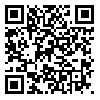Volume 25, Issue 1 (April & May- 2022)
J Arak Uni Med Sci 2022, 25(1): 40-53 |
Back to browse issues page
Download citation:
BibTeX | RIS | EndNote | Medlars | ProCite | Reference Manager | RefWorks
Send citation to:



BibTeX | RIS | EndNote | Medlars | ProCite | Reference Manager | RefWorks
Send citation to:
Darzi Poor M, Tavakoli R, Shojae Zade D, Rezagholizadeh Omran Z. The Effect of an Educational Program on Health Belief Model of Preventive Behaviors of Nosocomial Infection by Babol Hospitals Midwives. J Arak Uni Med Sci 2022; 25 (1) :40-53
URL: http://jams.arakmu.ac.ir/article-1-6821-en.html
URL: http://jams.arakmu.ac.ir/article-1-6821-en.html
1- Department of Health Education and Health Promotion, Faculty of Science and Technology, Science and Research Branch, Islamic Azad University, Tehran, Iran.
2- Health Education and Health Promotion Research Center, Faculty of Science and Technology, Science and Research Branch, Islamic Azad University, Tehran, Iran. ,r-tavakoli@srbiau.ac.ir
3- Health Education Department and Health Promotion Research Center, Faculty of Science and Technology, Science and Research Branch, Islamic Azad University, Tehran, Iran.
4- Clinical Research Development Center, Shahid Yaheinejad Hospital, Babol University of Medical Sciences, Babol, Iran.
2- Health Education and Health Promotion Research Center, Faculty of Science and Technology, Science and Research Branch, Islamic Azad University, Tehran, Iran. ,
3- Health Education Department and Health Promotion Research Center, Faculty of Science and Technology, Science and Research Branch, Islamic Azad University, Tehran, Iran.
4- Clinical Research Development Center, Shahid Yaheinejad Hospital, Babol University of Medical Sciences, Babol, Iran.
Abstract: (4480 Views)
Background and Aim Nosocomial infection is a health problem in all countries. Considering the role of midwives in controlling nosocomial infection, the aim of this study was to determine the effect of an educational intervention based on model on preventive behaviors of nosocomial infection by Babol hospitals midwives was done.
Methods & Materials The present study was a quasi-experimental study with intervention and control group. The interventions were performed in three 40-minute sessions in the Shahid Yahya Nejad Hospital in April and May 2017. The data collection tool was a structure Health Belief Model based(Awareness, structure Health Belief Model and behavior) on a questionnaire completed Its validity and reliability were assessed two months before and one month after Midwives who met the inclusion criteria education. Data were collected and analyzed by SPSS software v. 24 by Anova , T-test and ANCO one-way Covariance tests.
Ethical Considerations This research paper has been approved by the ethics committee IR.IAU.TMU.REC.1398.068 and informed consent will be taken from the participants in the study the information will remain confidential.
Results Before the intervention, the two groups did not differ significantly in terms of, mean scores of different model structures. After intervention, there was a significant difference in the mean and standard deviation of the effect of education on knowledge score (1.0±0.3), perceived sensitivity (2.8±1.5), perceived severity (3.6±1.7) Perceived barriers (-6.4±1.3), perceived benefits (5.1±4), self-efficacy (4.6 ± 2.6) and behavior( 3.1±1.1) was seen in the intervention group (P>0.05).
Conclusion By increasing the scores obtained from the structures Especially self-efficacy and reduction of perceived barriers, designing and implementing an educational program based on model in midwives can increase their performance regarding the prevention of nosocomial infections.
Methods & Materials The present study was a quasi-experimental study with intervention and control group. The interventions were performed in three 40-minute sessions in the Shahid Yahya Nejad Hospital in April and May 2017. The data collection tool was a structure Health Belief Model based(Awareness, structure Health Belief Model and behavior) on a questionnaire completed Its validity and reliability were assessed two months before and one month after Midwives who met the inclusion criteria education. Data were collected and analyzed by SPSS software v. 24 by Anova , T-test and ANCO one-way Covariance tests.
Ethical Considerations This research paper has been approved by the ethics committee IR.IAU.TMU.REC.1398.068 and informed consent will be taken from the participants in the study the information will remain confidential.
Results Before the intervention, the two groups did not differ significantly in terms of, mean scores of different model structures. After intervention, there was a significant difference in the mean and standard deviation of the effect of education on knowledge score (1.0±0.3), perceived sensitivity (2.8±1.5), perceived severity (3.6±1.7) Perceived barriers (-6.4±1.3), perceived benefits (5.1±4), self-efficacy (4.6 ± 2.6) and behavior( 3.1±1.1) was seen in the intervention group (P>0.05).
Conclusion By increasing the scores obtained from the structures Especially self-efficacy and reduction of perceived barriers, designing and implementing an educational program based on model in midwives can increase their performance regarding the prevention of nosocomial infections.
Keywords: Educational program, Health belief model, Preventive behaviors, Nosocomial infection, Midwife
Send email to the article author
| Rights and permissions | |
 |
This work is licensed under a Creative Commons Attribution-NonCommercial 4.0 International License. |








